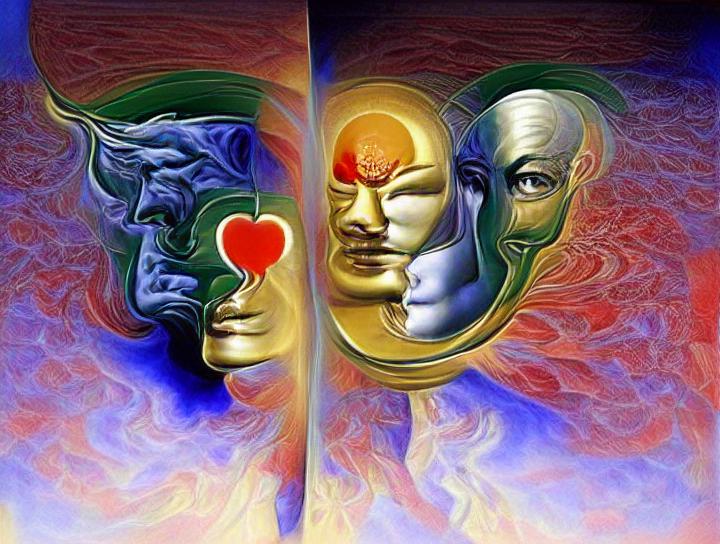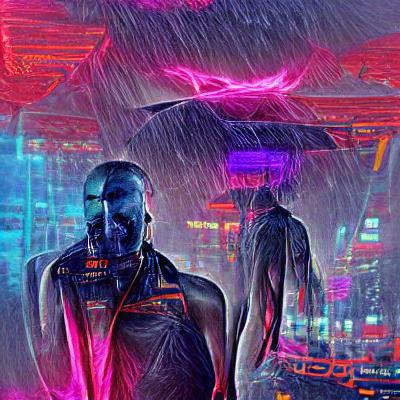
In any discussion of the psyche, there is reference to two primary aspects of the self. There are possibly other levels or gradations, but for our purposes here, I just want to elaborate on the two most commonly encountered groupings of the self as relevant to the human level. I intend to draw comparison between the True Self and the False Self, that latter of which is sometimes referred to as ‘ego’ or ‘small self’.
I don’t want to imply that this sense of self is false in the sense that no experience gained from that dimension is useful or valid, as limitation can certainly be learned from. I mainly wish to communicate that the False Self is a very limited and fragmented aspect of who we are, while True Self, by comparison, is where the energetic majority of our true identity naturally resides, whether we recognize it or not.
While we refer to the views of the False Self as illusory or false, I find it more useful to emphasise not so much the falsity of the aspect, but how limited in view the False Self is.
The view from the perspective of False Self is the internal modelling of how we appear in the world on the most superficial level, namely that we are a separate, individual ‘someone’ going about our business in time and space, which of course, is what it very much looks like at first glance. This view has been reinforced culturally, particularly in the West, although to some extent in most times and places.
The attributes of this view of the False Self are marked by a world of suffering and feeling alone, fearful, limited or trapped. They typically include some sense of being contracted, deluded, conflicted and existentially separate. It is not all misery, because this also accommodates thrills, exhilaration and an unbalanced sense of reward when our ego is seemingly approved of, enhanced or complimented. The view of the False Self is the basic platform from which the majority of human delusion operates.
The True Self, by contrast, is that which is naturally present when identity is withdrawn from the False Self. This can happen to a greater or lesser degree, and is often spontaneous and unpredictable.
Some people refer to the True Self as pure awareness, consciousness or any number of other names. The names really don’t matter here, because the nature of the True Self is categorically beyond language. When you touch upon it for the first time, this point cannot be missed. For our purposes, the only name we need here is one that will sufficiently distinguish it from the False Self.

When our identity has been reclaimed as True Self, it presents as expansive, peaceful, authentic and quite viscerally connected to Being. It accommodates all experience, but does not get caught up in any aspect of it. The True Self understands that experience doesn’t diminish or enhance it, so no sense of ‘self’ is invested in outward ventures. There is no further question as to the nature of our identity – it becomes a matter of immediate fact rather than theory.
How is it that we came to feel so separate in the first place when all that is really possible is the unity of being? This is unknown. Some have speculated a multitude of reasons such as an original fall from grace, humanity adopting language, or the divine wishing to explore itself eternally through lower, simpler forms in order to come to a complete knowing of itself through its various manifestations.
Perhaps it is a path of eternal discovery, or perhaps there is even some kind of progressive path hidden behind higher dimensions of illusion. I really wouldn’t know. I am only comfortable talking about that which I have touched upon experientially.
What I can talk about is these two primary aspects of the self, and their phenomenological investigation. One is highly limited, therefore affording a very closed and limited perspective of separation, whilst the other is connected, expansive, truth-congruent and holds a quality of depth that runs deeply into the source of what nourishes us energetically from within.
I like the image of a tall medieval tower fortress.
The sky above and all that it encompasses is the Source, The Ground of Being, or Reality. The perspective of the False Self is a little like a thin arrow slit somewhere toward the lower portion of the tower. From this narrow perspective, only a small amount of light is available, and only a sliver of the outside world can be apprehended, and not clearly at that. The direction is fixed, so alternative perspectives cannot be accommodated.
The view from the True Self, on the other hand, takes place atop the tower where the maximum view in all directions is afforded. Since there is no roof, you are as connected to the open sky as you can be. Nothing separates you from it, and your view over the parapets is unobstructed. A conscious reconnection with this expansive sense of self is sometimes referred to as ‘awakening’ or ‘enlightenment’, which are words that have been loaded with unhelpful implications.

Before I proceed further, I would like to elaborate on this point. Occupation with the True Self does not mean that you become holy, righteous, omniscient or omnipotent. We do not become our personal version of God. This is actually the furthest from how this works. False Self imagines ascension to godhood, while that which is true in us responds naturally in prostration before divine unity. The view of the False Self is tantalised by its idea of ascension to godhood, as an ego.
If you were a fish in the ocean, and you were limited by an egoic point of view, at some point you become taken with the notion of becoming the biggest fish in the ocean, able to dominate and exert its will over any other creature in the ocean. This is predictable, because it is inherent in the nature of ego to divide and conquer.
This view is limited at best, and at worst, immature and juvenile. Here we are coming back to the limitation of the view of the False Self again – this ego fish only conceives the solution to smallness and lack being upscaled to an imaginary quest for bigness and abundance. This is not an aspiration to transformative change, but a mere transposition of confusion from one scale to another.
The immensity of unity does not cater to egos, big or small. The True Self has no overlapping interests with the False Self. Everything that the False Self comes up with is a warped fantasy, totally removed from true abundance. The bigger picture is that this ego-ensnared fish is not at all separate from the totality of the ocean, the source of its life and being.
Because this understanding has nothing to offer a power-hungry, self-identified ego, the prospect of unity or nonseparation offers no appeal to the fish. If something is available to all people equally, ego cannot see its value. This is why to the False Self meeting a Hollywood celebrity is viewed as special while seeing the Moon in the sky is not, despite the Moon being far more famous throughout history than any celebrity. Some people have been able to meet this celebrity, while others have not. Nearly everyone, poor, wealthy, popular or friendless, gets to see the Moon at some point.
The vast majority of humans have been prey to the same predicament as this imaginary fish for centuries. The False Self has a pattern of encouraging derision toward people who have reconnected with being as pretenders to the throne of godhood who fail to deliver, and therefore ought to be scoffed at and ridiculed. Either that, or it worships them, aspiring to what it imagines them to have achieved.
This is because ego doesn’t see reality, it only projects other egos. It sees through its own filters, obscuring reality.
There is nothing to ridicule in being connected to the depths of your being. It is not a personal claim to godhood. Immodesty is something we quite willingly leave at the door when we retire from the demands of ego. We relax in the face of it. The True Self knows that there is no possibility of another being superseding another in worth. This is an ego game, and the play is very limited, which is why we must eventually come to find it tiresome both in ourselves and others. This pain is a grace that spurs us on to a more mature view of reality, along with our place within it.
I mentioned earlier that the terms ‘awakening’ and ‘enlightenment’ are somewhat overused, and I don’t believe these terms are necessarily helpful in this process. When we are talking about this, we aren’t talking about something that one person has access to while another doesn’t, or something that someone else has earned or been granted, while another has not.
In many important ways, Reality is quite ordinary in its nature – its miraculous gift is to be simply what it is. The terms of ‘awakening’ and ‘enlightenment’ pertain to a state of being, not a state of having. To recognise that which is already present and available is the culmination of the spiritual project, at which point it can be dispensed with.
Our true nature actually involves effortlessness. When we have crossed the river, we don’t need to go to the effort of carting the raft around on our backs. We do not dispense with being human, instead we begin to learn what being human means from a whole perspective that connects us consciously to Spirit and includes us in our human form, even with the view of the False Self not needing to be deliberately excluded.
Awakening does not produce gods or hyper-evolved supermen. People who have experienced a view of their true nature are still subject to the same range of potential errors as anyone else. They can still make idiots of themselves, they can still temporarily dip into unconscious behaviours, and even make choices that hurt other people.
We are not perfected in awakening to our True Self.
Sometimes awareness participates only in awareness, and at other times awareness can participate quite devotedly (or distractedly) in the contents of awareness by way of forms, thoughts, and other ephemera of the soul. There is no shame in this, only learning and the inevitable return to Truth. Distraction seems to be as much a part of awakening as awakening itself, in the same way that you can’t learn to bake a cake skilfully if there is not also the possibility of baking a cake unskilfully.
I think it would be more helpful to suggest that any glimpse of awakening however brief or minor, contributes to something I call operational clarity. This is how we come to the beginning of where we need to be if we are in recognition of our involvement in our natural identity as the True Self.
In this manner, we have a deeper and broader field of perspective to draw from, what others have referred to as ‘the thickness of the now’. The limited perspective of False Self is possessed of an exceptionally narrow sliver of now, which is why the decisions that come from it are generally unskilful, short-lived and operationally confused. Those decisions often lead to suffering.
The perspective of the awakened True Self, while not necessarily one of all-knowing godhood, is nevertheless one born of an awareness in a thicker now moment, allowing our choices to be naturally wise, spontaneous, and clear of purpose.
The ongoing challenge is keeping the mind and heart clear of obstruction, not so that we can be wise, but that universal wisdom may flow through us. We can’t possess it. Awareness, Source, God, Dao – call it what you like, only wants to give more and more of itself, so we never need to pretend we own it.
Our living birthright is also our living claim to un-specialness, from the perspective of ego. As long as we think we want something because it is special, or reserved for a select few, you can be sure you have revealed more fantasy on the part of the False Self.
*
Simon P Murphy is a Nelson-based esotericist and philosopher, and author of His Master’s Wretched Organ, a brilliant collection of weird fiction stories.
*
If you enjoyed reading this essay/article, you can get a compilation of the Best VJMP Essays and Articles from 2021 from Amazon for Kindle or Amazon for CreateSpace (for international readers), or TradeMe (for Kiwis). Compilations of the Best VJMP Essays and Articles of 2020, the Best VJMP Essays and Articles of 2019, the Best VJMP Essays and Articles of 2018 and the Best VJMP Essays and Articles of 2017 are also available.
*
If you would like to support our work in other ways, subscribe to our SubscribeStar fund, or make a donation to our Paypal! Even better, buy any one of our books!

Hello,
Great content. Not everything I agree with but never the less very thought provoking — which is a boon for this hemisphere.
Does the author have a email address and, furthermore, respond to inquiries?
Sincere regards,
Hello there,
the author will respond to inquiries, but he would have to be comfortable that you were genuine first!